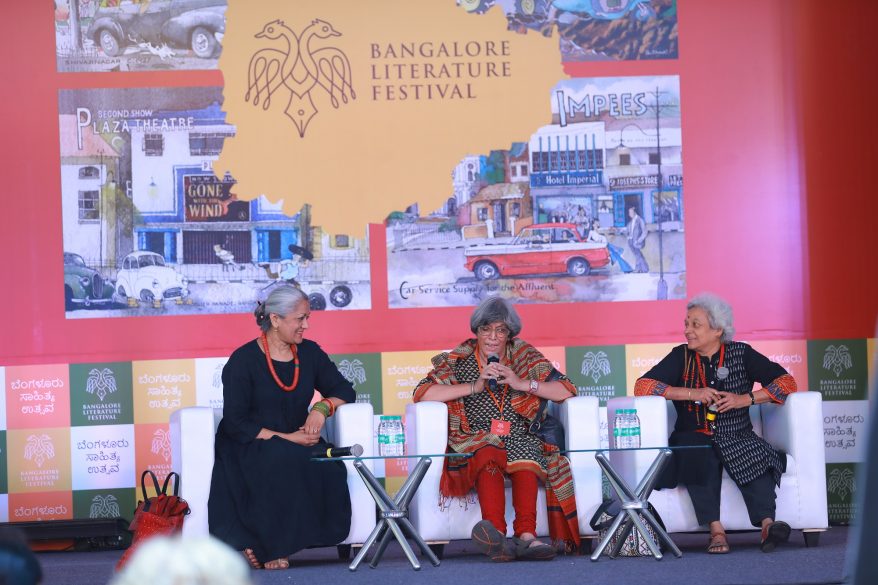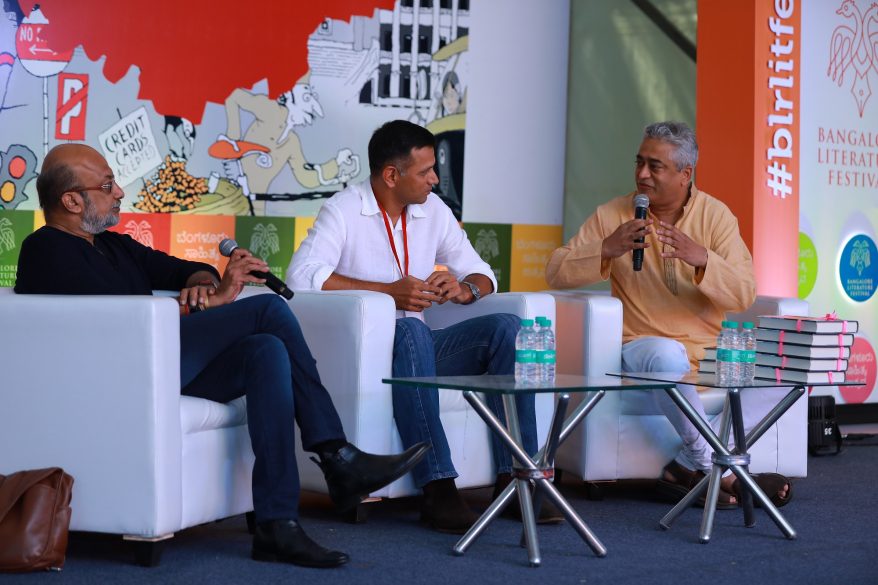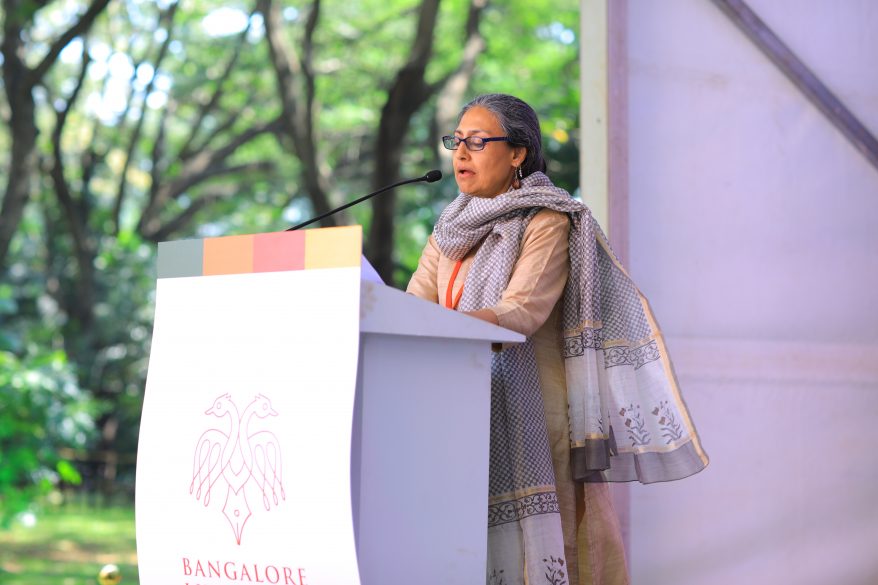Journalist Dhanya Rajendran moderated a discussion with Jairam Ramesh, Member of Parliament and Harini Nagendra, Professor of Sustainability, Azim Premji University. The session was titled ‘Nature and the City ‘ and the discussion was focused around two books – Jairam’s ‘A life in Nature’ and Harini’s ‘Nature in the City: Bengaluru in the Past, Present, and Future’. Continue reading “Nature and the City”
Border Tales
When a national security expert, a journalist, and a feminist come together to discuss their perspectives on Borders, you can expect some uncensored truths. The session, ‘Border Tales’ saw Bishwanath Ghosh and General Kamal Davar putting across their perspectives on Borders. Ritu Menon was there to moderate the discussion and honestly, the word shuttle she played with Kamal Davar was the much-needed light in the discussion. Continue reading “Border Tales”
India and China: How History is a Fickle Mistress
Author and Journalist, Raghu Karnad quotes journalist James Cameron as he sits down with India’s first woman Foreign Secretary Nirupama Menon Rao to discuss India and China. India and China: How History is a Fickle Mistress – the session could not be more aptly titled given the immense depth of the relationship between India and China. Continue reading “India and China: How History is a Fickle Mistress”
Nationalism, Populism and the Threat to the Global Liberal Order
6pm on 29th October | 2nd Day of the Bangalore Literature Festival – connoisseurs of literature moved through different directions; some took the left, another set walked from the right, and a few had to take the centre (political correctness?). Notwithstanding the route wished, granted, or taken, the feet of democracy converged at ‘Speak Up’ venue of the Bangalore Literature Festival to register their attendance for the numero-uno on the best-selling sessions list of the day titled ‘Nationalism, Populism and the Threat to the Global Liberal Order’.
Continue reading “Nationalism, Populism and the Threat to the Global Liberal Order”
Women in Contemporary Literature
Poet, Novelist Anjana Basu sat down with Historian, Creative Writer Ambai and Scientist, Fiction Writer Indira Chandrasekhar to discuss ‘Women in Contemporary Literature’. When Anjana wondered if the depiction of women in literature had changed in the recent times, Ambai clarified, “To say that the depiction has changed would mean that the earlier writers did not think about it. However, that is not correct. From Bhakti to erotica, women writers have written about everything even in earlier times.”
Indira on the other hand believes that the portrayal is changing because women’s voices have grown stronger in the recent times. She also explains how the struggles that a woman used to go through to enter the world of literature as a writer has become less dramatic now. Male writers dominated the literary scene during the 20th and the 21st century. The reason for such dominance was probably because the critics were mostly male. Now with a lot of female reviewers and critics, the scene is changing.
There was an accusation against women writers that they wrote mostly about domestic issues while men wrote about the societal issues. Indira says the conditions that prevail amongst the lives around the women writers compel them to write about the domestic issues. Ambai does not agree that women do not write about the world outside. She quotes example of a woman writer who wrote about her experiences of studying medicine and another where a writer talks about a younger cousin who is in love with a married elder cousin. Women have started exploring various relationships – their relationship with men, their relationship with their body etc, say the authors.
When asked about her story where a woman speaks to a spider, Ambai says that in ancient literature women always spoke to inhuman things. She adds that she too talks to the utensils in her house especially a Dosa tava which is troublesome if not spoken to.
Anjana explains how in recent times women superheroes have been created out of mythology. She quotes the example of Shakti who hunts demons. Indira welcomes the idea of a mythological superhero but also impresses upon the fact that every woman is a super hero of her own sorts. Indira also expresses her pleasure that the upcoming literature on women from mythology is an indication of how women have taken ownership of the narrative. She might not agree with some of the interpretations, nevertheless they are welcome changes.
Anjana questions how in the earlier days, queens were always the heroines of the stories. Ambai again says it is not true. Stories have been written about the common woman too. Unfortunately, those writers are not read by new age readers.
Ambai touches upon how a specific kind of language was used to talk about men and women in literature in the earlier days. She explains how a man is compared to a mountain and a woman to a creeper and her mouth to some fruit. If it is a man’s heart, it would rise and fall like the waves of the sea, but if it were a woman’s it would be like a boiling pot of water. Such choice of language is changing in the recent times according to Ambai.
When Indira talks about her story of a financially independent widow, she says she was worried if she was right to assume that a widow would be financially independent. She says she went on about researching to find if there ever existed such women in history and did find one in the 19th century. Ambai explains how her grandmother was a financially independent widow. Ambai also talks about how her mother was instrumental in getting her admitted to a college in Chennai and how she told her that all her dreams would come true. Such heroines have always been around us and we take them for granted, concludes Ambai.
India’s Democracy XI
In the kickoff event of Bangalore Literature Festival on Day 2, Prem Panicker, Rahul Dravid, and Rajdeep Sardesai began the session amidst the massive crowd who welcomed them with huge applause that steadily reached a crescendo. Prem presented Rahul as the only example in the universe that is so calm and immovable yet an irresistible and unstoppable force, the Golden Boy of cricket and Rajdeep as the history of cable television 24/7 in the country. He is an author who has written on politics and now cricket.
Festering Wounds – The 1984 Riots
While the session was titled ‘Festering Wounds – The 1984 Riots’, Preeti Gill, who is an independent editor and literary agent and someone who experienced the horror of 1984 first hand, broke ice with the panelists suggesting that to address the ‘84 violence as riots would be a tremendous mistake. According to Gill, it was a premeditated ethnic cleansing and a pogrom. She spoke of her brush with the 1984 violence and narrated how she was spared only because she didn’t wear any identification mark of a Sikh.
Silence – The Trolls are in Session
Women have always been easy subjects of harassment but the tragic death of Gauri Lankesh has sent us a very important message and it becomes very crucial to discuss the perils of being a woman journalist. The Bangalore literature festival had eminent journalists like Sindhu from Asianet news, Nidhi Razdhan from NDTV, Laxmi Murthy who works with International Federation of Journalists on issues of press freedom and journalists’ rights and award-winning journalist Ammu Joseph discuss and debate about what needs to be done to safeguard the women in journalism.
Remembering Gauri
The Bangalore Literature Festival began with ‘Remembering Gauri’. Gauri Lankesh whose tragic death continues to haunt our souls was given a heart stirring rendition by co-founder of Sandbox Collective,Nimi Ravindran, poet and theatre artist Padmavati Rao, and theatre artist Kabir Jaffrey.
#Blrlitfest 2017 is here
The Bangalore Literature Festival has arrived early this year. As we gear up for some scintillating conversations and intellectual gossips, I am all nostalgic about #Blrlitfest2016. The festival last year covered a diverse range of topics including history, politics, geography, biography, popular fiction, erotica, food, travel, evangelism, human rights and a lot more. You might want to read our report on the Festival here. I also remember how thrilled we were when the kind Mr Piyush Mishra agreed to our request for an interview.The experience of interviewing him was a reminder on how to stay grounded even when you achieve greater heights of stardom. Continue reading “#Blrlitfest 2017 is here”








